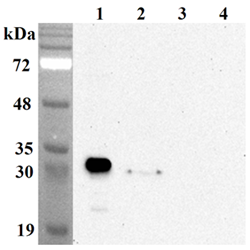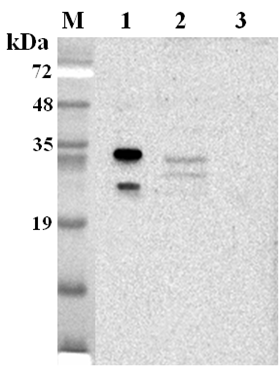
Western blot analysis using anti-NQO1 (human), mAb (Skiny-1) (Prod. No. AG-20A-0086) at 1:5000 dilution.1: Human NQO1 (His-tagged).2: A549 cell lysate.3: Unrelated (His-tagged) (negative control).4: Unrelated (His-tagged) (negativ
anti-NQO1 (human), mAb (Skiny-1)
AG-20A-0086
ApplicationsWestern Blot, ELISA
Product group Antibodies
ReactivityHuman
Overview
- SupplierAdipoGen Life Sciences
- Product Nameanti-NQO1 (human), mAb (Skiny-1)
- Delivery Days Customer10
- ApplicationsWestern Blot, ELISA
- CertificationResearch Use Only
- ClonalityMonoclonal
- Clone IDSkiny-1
- Concentration1 mg/ml
- HostMouse
- IsotypeIgG2a
- Protein IDQ3B792
- Protein NameNAD(P)H dehydrogenase [quinone] 1
- Scientific DescriptionMonoclonal Antibody. Recognizes human NQO1. Detects a band of ~32kDa by Western blot. Isotype: Mouse IgG2akappa. Clone: Skiny-1. Applications: ELISA, WB. Liquid. 0.2microm-filtered solution in PBS, pH 7.4. Contains no preservatives. NQO1 is a cytosolic antioxidant flavoprotein that catalyzes the reduction of highly reactive quinone metabolites and their derivatives by using NAD(P)H as an electron donor. Thus NQO1 acts as a detoxyfying enzyme and is involved in the bodys protection against oxidative stress. NQO1 acts as a protein chaperone, one of its targets being p53. In humans NQO1 is expressed at high levels in adipocytes and its expression levels are positively correlated with adiposity, glucose tolerance, and makers of liver dysfunction. Altered expression of NQO1 is associated with Alzheimers disease. NQO1 is abnormally elevated in many types of solid tumors and may represent a useful biomarker of pancreatic cancer. - NQO1 is a cytosolic antioxidant flavoprotein that catalyzes the reduction of highly reactive quinone metabolites and their derivatives by using NAD(P)H as an electron donor. Thus NQO1 acts as a detoxyfying enzyme and is involved in the bodys protection against oxidative stress. NQO1 acts as a protein chaperone, one of its targets being p53. In humans NQO1 is expressed at high levels in adipocytes and its expression levels are positively correlated with adiposity, glucose tolerance, and makers of liver dysfunction. Altered expression of NQO1 is associated with Alzheimers disease. NQO1 is abnormally elevated in many types of solid tumors and may represent a useful biomarker of pancreatic cancer.
- ReactivityHuman
- Storage Instruction-20°C,2°C to 8°C
- UNSPSC41116161

